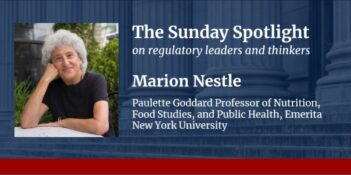
In this week’s Saturday Seminar, experts discuss ways to regulate psychedelics for medicinal use.
Kenny Stills, Aaron Rodgers, and numerous other professional athletes reportedly describe significant improvements to their mental health. What is the secret? The answer, the athletes supposedly say, is psychedelics.
Psychedelics, or hallucinogens, are substances that cause perceptual distortions and changes in cognitive processes. Psychedelics can be either synthetically produced or found in natural substances such as plants and fungi. The most common psychedelics include LSD, also known as acid, MDMA, also called ecstasy, and psilocybin, the active chemical in hallucinogenic mushrooms.
Stills and Rodgers have apparently described their use of psilocybin and ayahuasca, another plant-based hallucinogen, in an effort to improve their mental health. But evidence of successful psychedelic therapy is not solely anecdotal. Some recent research shows that psychedelics may be useful in treating mental health disorders, such as depression and post-traumatic stress disorder (PTSD), that affect millions of Americans each year.
If these drugs are helpful, what is keeping psychiatrists from prescribing psychedelics to patients?
According to some experts, stigmatization of psychedelic use has hindered the development of psychedelic medicine. Government and nonprofit campaigns, including the so-called War on Drugs, have preached anti-drug messages to children and teenagers for decades.
Regulatory barriers have also prevented researchers from effectively exploring psychedelics’ potential health benefits. In 1970, the U.S. Congress enacted the Controlled Substances Act (CSA), which classified drugs into different regulatory categories. Under this structure, the government has since classified many psychedelics as Schedule I substances, meaning that they have no currently accepted medical use, carry a high potential for abuse, and are subject to criminal penalties for their unauthorized use. Researchers must obtain approval from the U.S. Drug Enforcement Agency (DEA) to conduct studies of Schedule I substances.
The social stigma surrounding psychedelics, however, may be waning. A recent study found that 65 percent of Americans who are struggling with mental health want access to psychedelics as a treatment. Cities such as Detroit have already taken steps to decriminalize hallucinogens.
Reports indicate that drug developers may soon submit some hallucinogens to the U.S. Food and Drug Administration (FDA) for approval to treat mental health disorders. In July 2022, the Biden Administration indicated that it expects FDA to approve MDMA and psilocybin as treatments for PTSD and depression. And the DEA withdrew its prior proposal to classify five more psychedelics as Schedule I substances to give scientists the leeway to research their medicinal value.
In this week’s Saturday Seminar, we collect scholarship discussing obstacles to the development of psychedelic medicine and ways to regulate these drugs for use in health care.
- In an article published in the NYU Journal of Legislation and Public Policy, Mason Marks of the Petrie-Flom Center for Health Law Policy, Biotechnology, and Bioethics at Harvard Law School analyzes the social and legal barriers to developing psychedelic medicine. Marks argues that the mental health and opioid crises demand greater exploration of psychedelic use in health care. Marks suggests numerous ways to modify state and federal drug law to allow psychedelics to be studied and eventually offered to patients, such as removing psychedelics from the DEA list of Schedule I controlled substances, obtaining FDA approval for certain drugs, or decriminalizing and regulating psychedelics at the state level. Recent state legislation reform around marijuana could also serve as a guide to the decriminalization and development of psychedelic medicine, Marks writes.
- In an article published in Sociology Compass, Timothy Andrews and Katie Wright of La Trobe University analyze the challenges that inhibit the use of psychedelics in medicine, such as social stigmas and psychedelics’ criminalization. Deregulation of psychedelics, however, poses additional problems, Andrews and Wright argue. They contend that, if psychedelics were decriminalized, there may be blurred boundaries between therapeutic and recreational use, which can raise issues for regulating physicians’ administration of psychedelic medicine.
- In a recent Harvard Law Review essay, I. Glenn Cohen and Mason Marks of the Petrie-Flom Center for Health Law Policy, Biotechnology, and Bioethics at Harvard Law School explore the ways in which U.S. patent law may be facilitating the issuance of psychedelic patents that do not meet regulatory requirements. Cohen and Marks claim that many psychedelic patents are rendered ineligible under the approval requirements of the U.S. Patent and Trademark Office (PTO). Naturally occurring substances fall outside of the PTO’s scope of patentable subject matter, thus excluding many psychedelic substances, Cohen and Marks explain. They argue that these requirements push patent applicants to “game the system” and engage in bad faith practices to obtain approval. Cohen and Marks contend that PTO agents’ lack of expertise in psychedelic substances is an additional hindrance that results in a growing number of improper patents receiving approval without appropriate scrutiny.
- In an article published in Risk Management and Healthcare Policy, Rafael Guimarães dos Santos and several coauthors from the University of São Paulo discuss the cultural and religious uses of psychedelic drugs in different cultural contexts, arguing that they help shape the potential for psychedelic treatment in future health care policy. Studies conducted in cultural contexts where drug use is ceremonial or medicinal—rather than recreational—observe reduced anxiety and depression, decreased dependence on prescriptions, and improved psychosocial adjustment, among other health benefits, according to Dos Santos and his coauthors. They contend that psychedelic use is inevitable in western society, and, as a result, policymakers should opt for progressive and regulation-oriented approaches to psychedelics, rather than repressive and punitive ones.
- In an article published in The American Journal of Medicine, Matt Lamkin of the University of Tulsa College of Law analyzes the obstacles to incorporating psychedelic drugs into clinical practice. Despite promising psychedelic research in the mid-20th century, the CSA effectively banned psychedelics and inhibited research, Lamkin explains. Even if psychedelic drugs win FDA approval, they still cannot be legally prescribed because of their status as Schedule I substances, Lamkin contends. Furthermore, he explains that even if psychedelics’ Schedule I status is changed, some states can require regulatory action or new legislation before such drugs can be legally prescribed.
- In an article published in the Journal of the American Medical Association, William R. Smith, of the University of Pennsylvania Perelman School of Medicine, and Paul S. Appelbaum, of the Columbia University Vagelos College of Physicians and Surgeons, look to California and Oregon as two examples of psychedelic legalization. Oregon was the first state to legalize the clinical use of psilocybin, and California proposed a bill to legalize the possession, personal use, and noncommercial sharing of psychedelics by adults, Smith and Appelbaum explain. They argue, however, that rapid legalization and commercialization of psychedelics may be harmful, as the likelihood of psychotic episodes and other health risks is uncertain outside of controlled trials. Smith and Appelbaum recommend slowing the legalization of psychedelics to allow time for proper evaluation of the evidence of therapeutic benefits and potential risks, ensuring that policymakers and the public have the information necessary to develop careful regulatory policy.
The Saturday Seminar is a weekly feature that aims to put into written form the kind of content that would be conveyed in a live seminar involving regulatory experts. Each week, The Regulatory Review publishes a brief overview of a selected regulatory topic and then distills recent research and scholarly writing on that topic.



